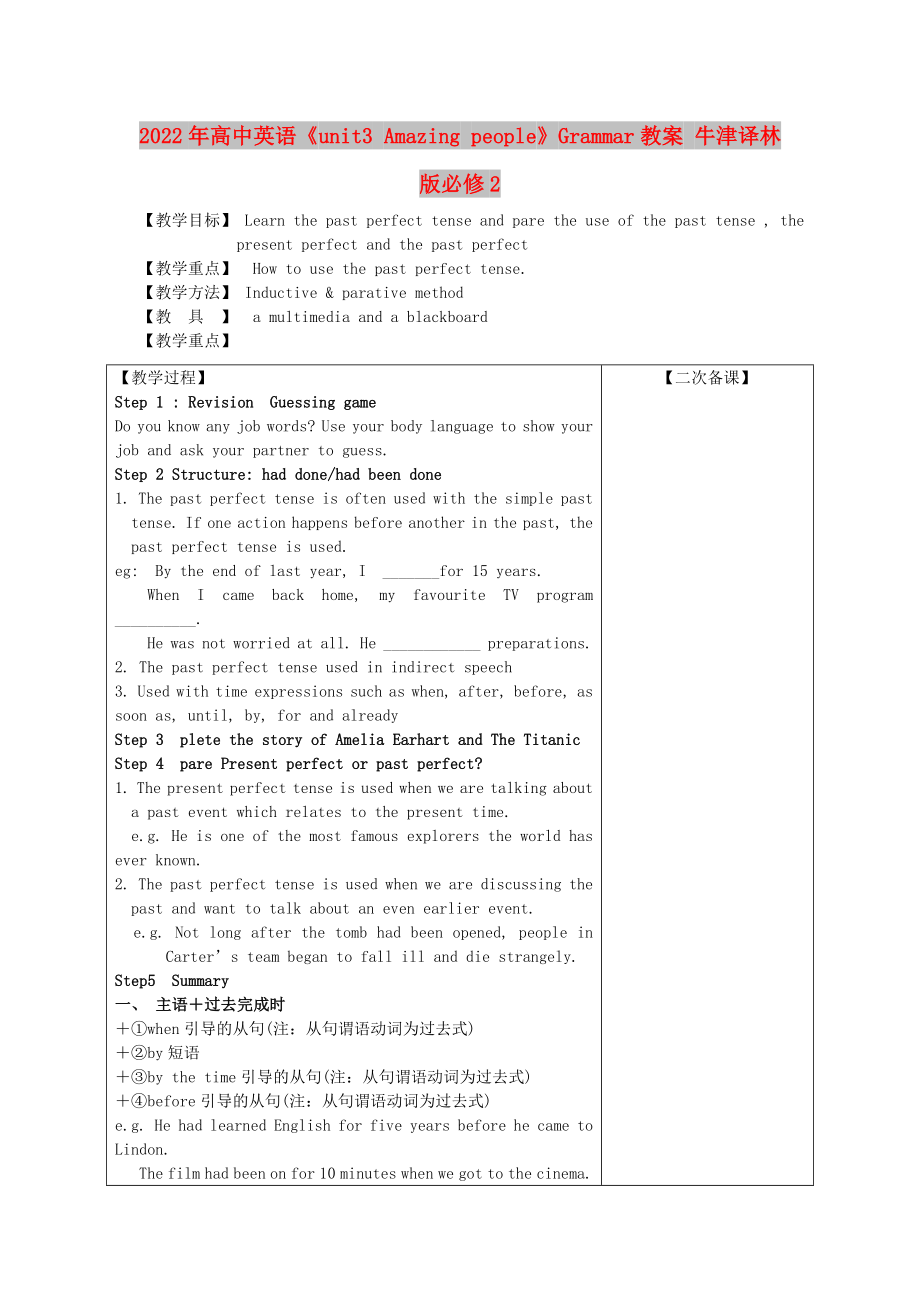《2022年高中英語《unit3 Amazing people》Grammar教案 牛津譯林版必修2》由會(huì)員分享�,可在線閱讀���,更多相關(guān)《2022年高中英語《unit3 Amazing people》Grammar教案 牛津譯林版必修2(2頁珍藏版)》請?jiān)谘b配圖網(wǎng)上搜索。
1���、2022年高中英語《unit3 Amazing people》Grammar教案 牛津譯林版必修2
【教學(xué)目標(biāo)】 Learn the past perfect tense and pare the use of the past tense , the present perfect and the past perfect
【教學(xué)重點(diǎn)】 How to use the past perfect tense.
【教學(xué)方法】 Inductive & parative method
【教 具 】 a multimedia and a blackboard
【教學(xué)重點(diǎn)】
【教學(xué)過
2���、程】
Step 1 : Revision Guessing game
Do you know any job words? Use your body language to show your job and ask your partner to guess.
Step 2 Structure: had done/had been done
1. The past perfect tense is often used with the simple past tense. If one action happens before another in the past, the
3、 past perfect tense is used.
eg: By the end of last year, I _______for 15 years.
When I came back home, my favourite TV program __________.
He was not worried at all. He ____________ preparations.
2. The past perfect tense used in indirect speech
3. Used with time expressions such as when, a
4�����、fter, before, as soon as, until, by, for and already
Step 3 plete the story of Amelia Earhart and The Titanic
Step 4 pare Present perfect or past perfect?
1. The present perfect tense is used when we are talking about a past event which relates to the present time.
e.g. He is one of the most f
5��、amous explorers the world has ever known.
2. The past perfect tense is used when we are discussing the past and want to talk about an even earlier event.
e.g. Not long after the tomb had been opened, people in Carter’s team began to fall ill and die strangely.
Step5 Summary
一��、 主語+過去完成時(shí)
+①when引
6、導(dǎo)的從句(注:從句謂語動(dòng)詞為過去式)
+②by短語
+③by the time引導(dǎo)的從句(注:從句謂語動(dòng)詞為過去式)
+④before引導(dǎo)的從句(注:從句謂語動(dòng)詞為過去式)
e.g. He had learned English for five years before he came to Lindon.
The film had been on for 10 minutes when we got to the cinema.
By the time he was 14, he had biult his own lab.
二�����、間接引語(say,ask,w
7�、onder,tell等)或某些從句
e.g. My father told me he had got the news.
The students showed us everything that they had made by hand.
三、常用句型 hardly…when…& no sooner…than…
e.g. Hardly had we arrived home when it began to rain.
No sooner had he put down the bowl than the phone rang.
四�����、表示過去未曾實(shí)現(xiàn)的愿望��、打算
8���、或意圖����,用過去完成時(shí)����。常用動(dòng)詞有:hope,think��,expect��,intend,mean�,suppose,want等���,意為“原打算做某事”�����。
e.g. They had wanted to help but couldn't get here in time.
他們本來是要來幫忙的���,但未能及時(shí)趕到。
五���、It was+時(shí)間段+since+主語+過去完成時(shí)
It was+次數(shù)+that+主語+過去完成時(shí)
e.g. It was five years since he left his hometown.
It was the first time that I had been to the city.
【二次備課】
【作業(yè)布置】
【教學(xué)后記】
 2022年高中英語《unit3 Amazing people》Grammar教案 牛津譯林版必修2
2022年高中英語《unit3 Amazing people》Grammar教案 牛津譯林版必修2

